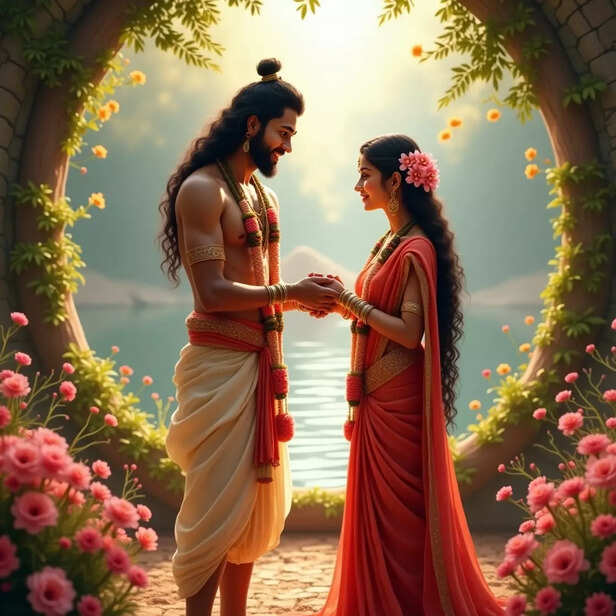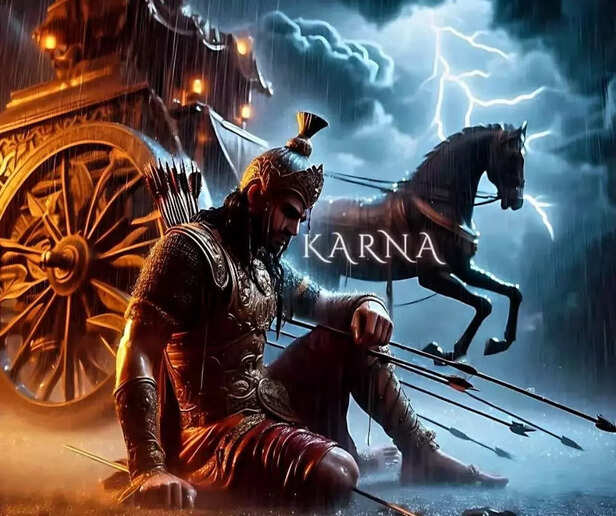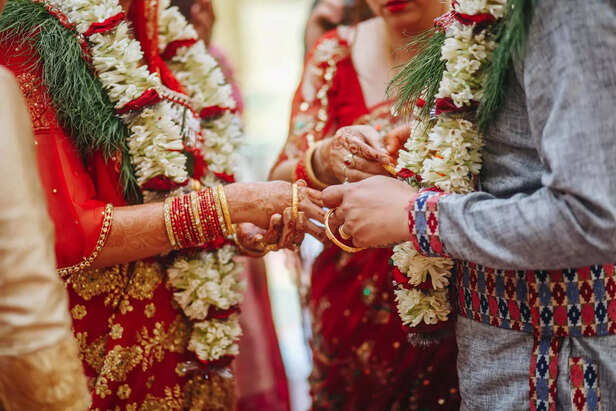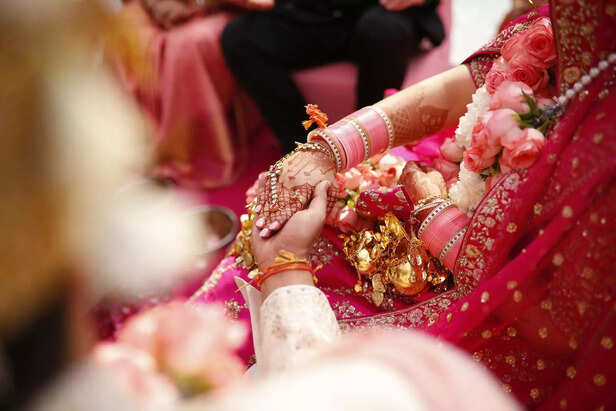Marriage, Dharma, and Desire: What Our Epics Got Right (and Wrong)
Ankita Rai | Wed, 16 Apr 2025
Indian epics like the Ramayana and Mahabharata reveal complex truths about marriage, duty, and desire. Far from ideal love stories, these tales highlight emotional conflicts, power dynamics, and silent sacrifices. This piece explores how marriage in Indian epics wasn’t just sacred—it was often a battleground where dharma and desire in mythology clashed, shaping the course of Hindu epics and relationships for generations to come.

Photo:
In ancient Indian legends, marriage was never solely about affection—it was a crucible of loyalty, sacrifice, power, and intention. The Ramayana and Mahabharata—India’s most revered stories—present a diverse spectrum of relationships that continue influencing cultural values. When examining marriage in Indian epics carefully, we find narratives brimming with emotional complexity, moral contradictions, and silent resistance. These tales do not offer us one truth; rather, they confront us with many.

Sita and Rama are frequently glorified as the ideal royal couple. However, beneath their divine facade lies a deeply painful account. Rama’s decision to exile a pregnant Sita—despite her proven fidelity—stemmed not from distrust but from his kingly duty to appease public scrutiny. This moment lays bare the tension between dharma and desire in mythology. Rama, the ideal ruler, sacrifices personal bliss at the altar of public responsibility. Sita, the devoted wife, bears the burden of that sacrifice. Her longing for fairness and dignity was overshadowed by society's perceived demands of dharma. This raises an uncomfortable question: can moral righteousness justify emotional cruelty?

In the Mahabharata, Draupadi's marriage to the five Pandavas is one of the most debated relationships in legend. Her polyandrous union wasn't her choice—it was dictated by circumstances and her mother-in-law’s word. Still, Draupadi is no silent figure. She challenges her husbands when they fail her, especially during the game of dice, where she’s publicly humiliated and abandoned. Her experience elucidates how Hindu epics and relationships explored not just societal standards but also the silent resistance within them. Draupadi's yearnings—for justice, respect, and agency—are unmistakable. Her courage to confront wrongs, even within her marriage, renders her one of mythology's boldest voices. Kunti and Gandhari: The Silent Shapers Though often seen as background characters, women such as Kunti and Gandhari wield immense sway in the Mahabharata. Kunti's choice to invoke divine powers to bear sons before matrimony, and later keep Karna's individuality secret, alters the course of the epic. Gandhari, on the other hand, selects to blindfold herself as a symbol of solidarity with her blind husband Dhritarashtra. These decisions demonstrate how marriage in Indian epics wasn't always about romance—it was a framework through which women negotiated power, sacrifice, and personality. Kunti used silence as a shield and strategy. Gandhari's anguish transformed into prophecy when she cursed Krishna, changing the fate of his lineage. Their experiences reflect how women's inner struggles and choices formed the epic world around them.

The Mahabharata is filled with men torn between personal longing and ethical obligation. Bhishma's vow of celibacy—taken to ensure his father's marriage—renders him a tragic figure, bound by a promise that isolates him for life. Karna, too, chooses loyalty to Duryodhana over kinship with the Pandavas, longing more for acceptance than for righteousness. These characters reveal that dharma and desire in mythology are often in direct conflict. Bhishma's sense of duty leaves no room for emotional satisfaction. Karna's pursuit of validation blinds him to moral consequence. Both stories emphasize how following a rigid moral code can lead to personal devastation.

Our epics don't glorify marriage - they depict it as dynamic, shaped by responsibilities, roles and individual drive. At times, like Sita's banishment or Draupadi's degradation, the price of public virtue comes into focus. Elsewhere, like Kunti's secret or Gandhari's sacrifice, we see complex negotiations of duty. By exploring Hindu legends and relationships, we understand dharma adapts - context matters. Personal wants, whether affection, fairness, respect or recognition, count as much as obligations. These tales remind that feeling merits consideration alongside ethics.
Relevance Now: Learning from History

Today, where bonds face societal expectations and private wishes, Indian myths resonate. They affirm that no union, married or otherwise, proceeds easily. Perhaps most significant, responsibility absent care, affection lacking autonomy, both falter eventually.
Revisiting marriage in ancient narratives offers more than moral lessons - we find our own experiences, choices and constant balancing of what's expected versus heart's true preferences reflected back at us.
Unlock insightful tips and inspiration on personal growth, productivity, and well-being. Stay motivated and updated with the latest at My Life XP.
Frequently Asked Questions (FAQs)
Sita and Rama: Love Eclipsed by Obligation

Ram Sita
Sita and Rama are frequently glorified as the ideal royal couple. However, beneath their divine facade lies a deeply painful account. Rama’s decision to exile a pregnant Sita—despite her proven fidelity—stemmed not from distrust but from his kingly duty to appease public scrutiny. This moment lays bare the tension between dharma and desire in mythology. Rama, the ideal ruler, sacrifices personal bliss at the altar of public responsibility. Sita, the devoted wife, bears the burden of that sacrifice. Her longing for fairness and dignity was overshadowed by society's perceived demands of dharma. This raises an uncomfortable question: can moral righteousness justify emotional cruelty?
Draupadi’s Marriage: Consent or Compromise?

Draupadi with Pandavas
In the Mahabharata, Draupadi's marriage to the five Pandavas is one of the most debated relationships in legend. Her polyandrous union wasn't her choice—it was dictated by circumstances and her mother-in-law’s word. Still, Draupadi is no silent figure. She challenges her husbands when they fail her, especially during the game of dice, where she’s publicly humiliated and abandoned. Her experience elucidates how Hindu epics and relationships explored not just societal standards but also the silent resistance within them. Draupadi's yearnings—for justice, respect, and agency—are unmistakable. Her courage to confront wrongs, even within her marriage, renders her one of mythology's boldest voices. Kunti and Gandhari: The Silent Shapers Though often seen as background characters, women such as Kunti and Gandhari wield immense sway in the Mahabharata. Kunti's choice to invoke divine powers to bear sons before matrimony, and later keep Karna's individuality secret, alters the course of the epic. Gandhari, on the other hand, selects to blindfold herself as a symbol of solidarity with her blind husband Dhritarashtra. These decisions demonstrate how marriage in Indian epics wasn't always about romance—it was a framework through which women negotiated power, sacrifice, and personality. Kunti used silence as a shield and strategy. Gandhari's anguish transformed into prophecy when she cursed Krishna, changing the fate of his lineage. Their experiences reflect how women's inner struggles and choices formed the epic world around them.
Bhishma, Karna, and the Burden of Vows

Karna
( Image credit : Pixabay )
The Mahabharata is filled with men torn between personal longing and ethical obligation. Bhishma's vow of celibacy—taken to ensure his father's marriage—renders him a tragic figure, bound by a promise that isolates him for life. Karna, too, chooses loyalty to Duryodhana over kinship with the Pandavas, longing more for acceptance than for righteousness. These characters reveal that dharma and desire in mythology are often in direct conflict. Bhishma's sense of duty leaves no room for emotional satisfaction. Karna's pursuit of validation blinds him to moral consequence. Both stories emphasize how following a rigid moral code can lead to personal devastation.
What the Epics Got Right—and What They Missed

marriage
( Image credit : Pexels )
Our epics don't glorify marriage - they depict it as dynamic, shaped by responsibilities, roles and individual drive. At times, like Sita's banishment or Draupadi's degradation, the price of public virtue comes into focus. Elsewhere, like Kunti's secret or Gandhari's sacrifice, we see complex negotiations of duty. By exploring Hindu legends and relationships, we understand dharma adapts - context matters. Personal wants, whether affection, fairness, respect or recognition, count as much as obligations. These tales remind that feeling merits consideration alongside ethics.
Relevance Now: Learning from History

Indian marriage
( Image credit : Pexels )
Today, where bonds face societal expectations and private wishes, Indian myths resonate. They affirm that no union, married or otherwise, proceeds easily. Perhaps most significant, responsibility absent care, affection lacking autonomy, both falter eventually.
Revisiting marriage in ancient narratives offers more than moral lessons - we find our own experiences, choices and constant balancing of what's expected versus heart's true preferences reflected back at us.
Unlock insightful tips and inspiration on personal growth, productivity, and well-being. Stay motivated and updated with the latest at My Life XP.
Frequently Asked Questions (FAQs)
- What are the 8 types of marriage in Vedas?
The Vedas describe eight types of marriage: Brahma, Daiva, Arsha, Prajapatya, Gandharva, Asura, Rakshasa, and Paisacha. - What do Vedas say about marriage?
The Vedas view marriage as a sacred union based on dharma, companionship, and the pursuit of spiritual and societal duties. - What are the 8 types of marriage in Mahabharata?
The Mahabharata echoes the Vedic classification, describing the same eight types of marriages with contextual examples from the epic.










